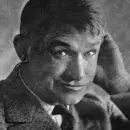
William Penn Adair “Will” Rogers
William Penn Adair “Will” Rogers was an entertainer, radio personality, film actor, and writer, famous for his homespun humor and social commentary. Born a citizen of the Cherokee Nation to a family of Cherokee and European ancestry, Rogers learned how to ride a horse and do rope tricks while growing up on a ranch in Oklahoma. He worked in various Wild West shows in the United States and overseas, and in 1905 he displayed his roping skills at a show at Madison Square Garden.
In New York City, he began working in vaudeville and appeared in his first Broadway show, The Wall Street Girl, in 1912. That year, he was hired for the cast of Ziegfeld’s Midnight Frolic. From Midnight Frolic, Rogers moved to the prestigious Ziegfeld Follies on Broadway in 1916, a yearly production in which he appeared until 1925. In 1918, Rogers starred in his first film, Laughing Bill Hyde, and went on to appear in silent features for producer Sam Goldwyn, as well as several comedies he produced himself and a series of Hal Roach two-reelers. In 1929, Rogers made his first talking picture, They Had to See Paris. By 1933 Rogers was the highest paid film star in Hollywood. Notable among his seventy-one films are A Connecticut Yankee (1931) and State Fair (1933).
In 1922, Rogers began to write a weekly column for a New York paper and, after 1926, a brief daily “telegram” as well. Both were syndicated and eventually distributed around the nation to more than five hundred newspapers, including The New York Times. His frequent after-dinner speaking engagements and radio broadcasts in the 1920s and 1930s put him in touch with groups across American society. His fame opened doors to travel and to high-profile friendships, such as with Calvin Coolidge, Henry Ford, Thomas Edison, Charles Lindbergh, numerous senators and congressmen, and movie celebrities, and led to books like Letters of a Self-Made Diplomat to His President (1926). Rogers served as a goodwill ambassador to Mexico.